Canada, Windsor OAS FTAA, report
From: Jean Grossholtz
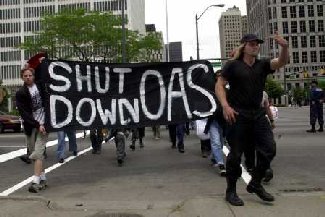 Report from Windsor
Report from Windsor
On Sunday, June 1, 5000 people marched in Windsor, Ontario to protest the Free Trade Agreement of the Americas being discussed at the Organization of American States meeting. For three days University people, Labor Unions and the protest groups had held open forums on the Free Trade Agreement and the effects of NAFTA on the hemisphere's people. Women, indigenous groups, labor people all told their stories. Led by the Canadian labor unions, the rally before the march featured clothes lines of dirty laundry hung up by the women of Canada in opposition to the NAFTA and the pending FTAA. The demonstrators were well informed. Not so the commercial press and police.
This entire activity, barely noted in the world's press, was regarded by the police and handled as something akin to a terrorist riot. It was almost a waste of time for protesters in Windsor trying to point out the lack of democracy in the proceedings, because the police in the city had already made it clear that this was a totally non-democratic process. In this small city the entire area where the OAS was meeting, holding its garden party, and staying in hotels had been blockaded.
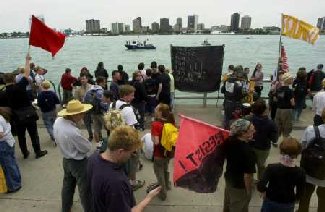 Around 200 protesters tried to blockade the entrances and exit to the OAS area. Big cement triangle shaped barriers that are used on highways when lanes are being changed during construction were laid down around this area. On top of those barriers had been built 8 foot chain-link fences. Behind the fences were large numbers of police and stationed in front of them were roaming groups of police in riot gear.
Around 200 protesters tried to blockade the entrances and exit to the OAS area. Big cement triangle shaped barriers that are used on highways when lanes are being changed during construction were laid down around this area. On top of those barriers had been built 8 foot chain-link fences. Behind the fences were large numbers of police and stationed in front of them were roaming groups of police in riot gear.
Acting in peaceful, non violent manner the protestors, mostly young people but also including some older union members and progressive citizens, were prepared to be arrested in order to call attention to the fact that the provisions of the FTAA and OAS deliberations were being kept secret. The protests were aimed at trying to open a dialogue between those pushing the FTAA agenda and the people of the world. Protestors and marchers alike were opposed to the secrecy and undemocratic process by which this decision was being made.
I was there with "Think Defiant", an 11 member affinity group from Western Massachusetts. We provided letters for people to sign one to Cesar Gaviria, the head of OAS, and one to their MP or Senator. Over 800 letters were signed.
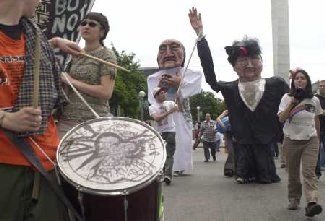 The actions of the police who readily admitted they had engaged in surveillance of the protest groups. They had also engaged the customs and immigration officials at the borders. Many people were stopped some of the participants cars were searched and all their papers photocopied. Police said at least a dozen people were turned away at the border.
The actions of the police who readily admitted they had engaged in surveillance of the protest groups. They had also engaged the customs and immigration officials at the borders. Many people were stopped some of the participants cars were searched and all their papers photocopied. Police said at least a dozen people were turned away at the border.
Our own experience in Windsor was frightening in its potential. We were followed, sometimes on foot, sometimes by vans. One of our members riding a bicycle through the demonstrators was stopped for riding his bicycle the wrong way on a one-way street. This in a street filled with pedestrians and closed to traffic. He was told to leave the downtown area. Later driving our rental van he was stopped and the van searched. Everything in it was opened and taken out. It seemed that he had been targeted earlier and followed.
On the Monday morning after the news conference my car was parked (legally) down town. When we went back to the car there was a large red van parked blocking my exit. I thought it was simply some delivery person who had inadvertently blocked me. After a few minutes the car behind me moved and I backed up and maneuvered my car out into the traffic only to discover that the van was a Police van full of police and an a woman sergeant was leaning out the door watching me. I waved and went around her and over to the next block to meet up with our other car. I parked the car in front of the others, in a legal parking place. As I was about to get out to talk with them the red van came around the corner and drew up beside me trapping me within the car. The woman police officer examined our car and its passengers leaning out her window to see who was in the car. She asked me where we were from. I told her and we had a little chat about what was happening. She asked where we were going and I said home. She said that would be good. I then told her about the privatization of services agreement contained in the FTAA and what it would mean for her health care. I pointed out to her what privatization meant as in the United States the health care system would be run not by medical people but by insurance companies and global companies at that. She said something that sounded interested but then returned to her previous attempt to intimidate. They then left and we went about our business.
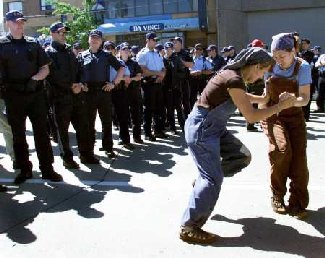 It was clear we had been targeted. Early in the morning of Tuesday, at the Niagara US border, our car was stopped. After the customs people had looked at the plates they took our identification and had me drive the car into a small shed where they removed everything from the car and looked at it. I asked if they were looking for drugs, but they said no it was just a routine check. They were very polite but they were also copying our identities into their computers. Meanwhile other cars were waved on by. The second of our vehicles the rental van was then stopped as well. (Routine?)
It was clear we had been targeted. Early in the morning of Tuesday, at the Niagara US border, our car was stopped. After the customs people had looked at the plates they took our identification and had me drive the car into a small shed where they removed everything from the car and looked at it. I asked if they were looking for drugs, but they said no it was just a routine check. They were very polite but they were also copying our identities into their computers. Meanwhile other cars were waved on by. The second of our vehicles the rental van was then stopped as well. (Routine?)
It is clear that the police forces of the United States and Canada have created a global monster in the form of something they call the lesson of Seattle. (The Mayor of Detroit wanted to outlaw water bottles as they might contain gasoline. His list of possible dangers caused much hilarity but raised some fears as well.) In response the police forces have created a strategy of barricades, intimidation and targeting of what they think are leaders. All in order to stop the peaceful protesting and the demand for public information and d=for the public accountability of the government bureaucrats and global corporations who are creating international agreements on trade and investment in secret.
The police actions intend to block all public participation and knowledge of what is going on behind those closed doors. If any one closes down democracy it is these very individuals that have ordered the police to protect them from the people. The police have been told to respond to planned demonstrations with massive force, infiltration of protest groups, targeting of individuals, and closing of national borders to citizens who disagree with their policies.
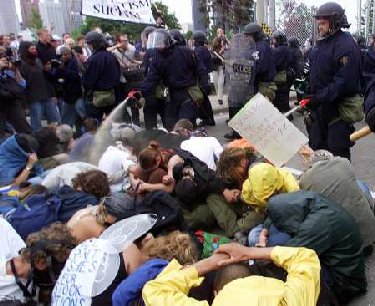 The police are being forced to take the role as protectors of the system that no longer is rooted in public will or the common good, but is under the control of the very small handful of global corporations with direct input into government and international decisions. A national government's laws can be (and many have been) overturned by a handful of bureaucrats sitting in Geneva whose names we don't even know.
The police are being forced to take the role as protectors of the system that no longer is rooted in public will or the common good, but is under the control of the very small handful of global corporations with direct input into government and international decisions. A national government's laws can be (and many have been) overturned by a handful of bureaucrats sitting in Geneva whose names we don't even know.
The fight is not between protesters and police. The fight is between protesters and those who make these decisions without our consent Often when we have been able to talk to police in one on one encounters, they tell us they do not understand what is going on or why they are being called out.
The police are supposed to be citizens acting out of their belief that the public needs to be protected. When they become the hired hands of global corporations we are well on the way to a police state. One police officer quoted in the press said he "believed the banks were taking over the world" but his companion added, that did not mean "you can break their windows." In fact no windows were broken nor were there any plans to break windows.
It was obvious at the rally that people were very angry about the previous series of agreements from the Uruguay round to the WTO and the NAFTA and asking for public disclosure of the contents of this new treaty. There is no public document, no press coverage of what this FTAA is about. Most of us in Windsor had participated in the (successful) fight to stop the Multilateral Agreement on Investment. This agreement would have guaranteed the right of corporations to invest in any arena of any country without regulation, and even to transfer its executives and labor, without visas or passports. The MAI was on its way to becoming an international treaty without public debate and my own congressman did not know what it was or would accomplish.
Now are faced with the extension of NAFTA to the hemisphere and the inclusion of some the service aspects we fought against in Seattle, provisions that would require the privatization of all services including health care, prisons, water, education, etc.
The provisions of these agreements cannot be the provenance of a handful of international bureaucrats and corporate executives meeting behind closed doors and now closed cities.
Thousands of peaceful citizens in the United States and Canada have tried various methods to demand an open democratic dialogue. Not finding this available in national legislatures or in the press, they have taken to the streets. They will stand up against global corporations, some with economies larger than most countries, bent on market control at all cost, guilty of inhuman labor practices or destroying the environment.
Oeither in Seattle, nor Washington, nor Windsor was any property and life in danger from the protestors. The danger came, as it did in Seattle, from the police. Having been at Seattle, Washington and now Windsor. There is no question of the popular support that came from the unions and from the local people.
Os anyone in Seattle at that time will tell you the mayor and the police declared martial law and closed down the city because they could not open the streets. The sheer number of protestors and labor union people objecting to the WTO's proposals by sitting in the streets was not cause for police action but cause for serious reconsideration by those making the agreements.
The myth of Seattle has created a monster response by the police forces of this country. Those who order the police must know that our numbers grow every day. People will not sit quietly by and watch the planet destroyed, their food supply taken over by corporate agriculture and "life sciences", their biological heritage patented by private individuals, their livelihoods dependent on an economy aimed at driving down the price of labor, and the end of any public concern for water, electricity, communications, health care, or education.
There is precious little time left for public discussion. The Windsor experience makes clear that the police state we have seen in other places is close to reality in our own midst.
There will be massive demonstrations at the Republican convention. Count on it. There will also be massive demonstrations at the Democratic convention. These young people are not going away. They see this fight as a fight for their lives for a decent future based on human values. They can not go home until they are assured of that future. We face an enormous clash between police geared up for a riot and protestors intent on creating a forum for public education.
In Windsor the long march past the OAS meeting area, included music, puppets, people dressed in odd costumes, a lot of colorful banners and information pamphlets passed out. No one really listened. They saw only the police.
David Bleakney
National Union Representative
Canadian Union of Postal Workers
http://www.wtocaravan.org
http://www.cupw-sttp.org
FTAA Toronto protests, November 1999 | FTAA Quebec, April 2001 | actions 2000 | www.agp.org